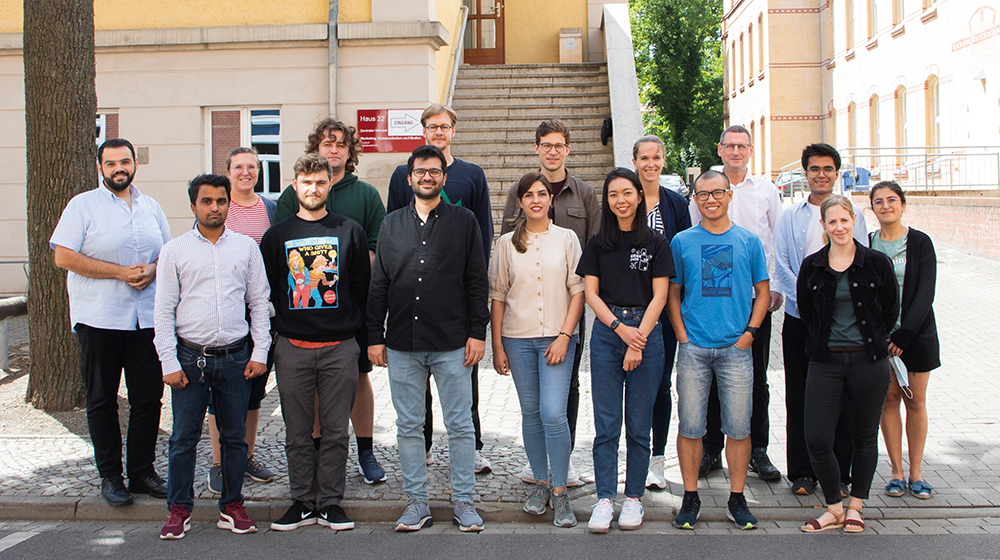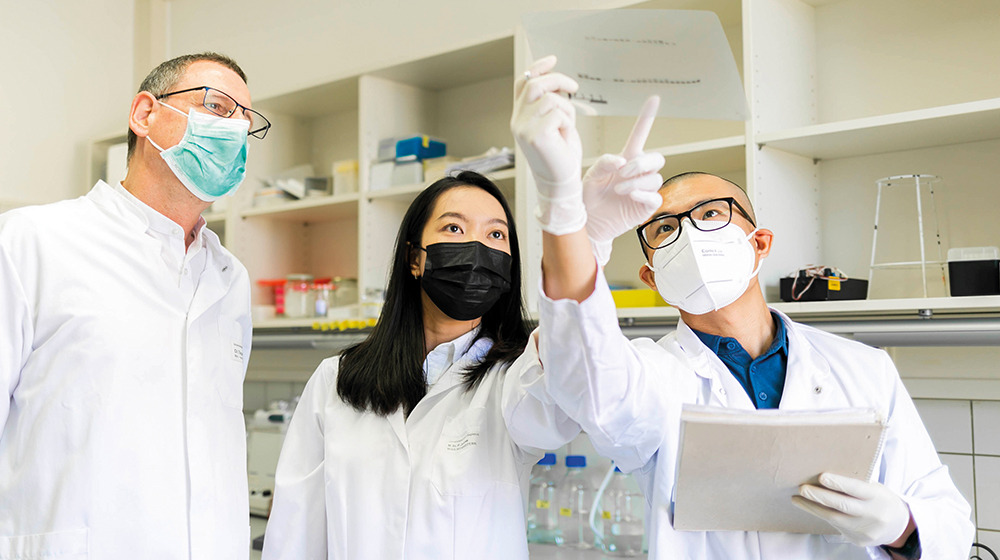
The problems and questions of our time, which are exercising many people, are complex. Finding solutions increasingly often demands cooperation between different disciplines, including beyond the limits of individual organizations. There are many examples of such collaborations at our university. Research Training Group 2408 in the Faculty of Medicine is one of them. The scientists explain what working in an international and interdisciplinary team is like, what they are working on together and what the challenges are that they currently face.
Phatcharida Jantaree still clearly remembers her arrival in the main railway station in Magdeburg almost four years ago: “I was really irritated. It was Sunday, all of the shops were closed and there was almost nobody out on the streets. In Thailand, Sunday is not a day of rest. Everyone works normally seven days a week there. “ These days, through her work in Research Training Group (GRK) 2408, Jantaree has become familiar with many other German customs and feels at home in Magdeburg. The 32-year-old studied Biochemistry and Biochemical Technology (BSc) and Applied Biosciences (MSC) in Thailand. She has gained the freedom to work in the laboratory on Sundays too. “We manage things very openly and share information, depending on who is in the laboratory at that time, about our work, including at the weekends. This is in line with scientific culture and also reflects the doctoral students’ different individual ways of working,” is how Professor Dr. Michael Naumann, spokesperson of the GRK, describes the organization of his team.
Phatcharida Jantaree is one of over 30 scientists in GRK 2408 who, since October 2018, have been exploring the question of which molecular processes between individual cells play a decisive role in the emergence of chronic diseases. This is because chronic diseases pose a major risk to health and are increasingly placing strain on health systems. It is a complex issue that is being worked on by a complex team: in the research and training program for up-and-coming scientists, experienced natural scientists from the disciplines of cell biology/ biochemistry, microbiology/immunology and molecular biology, as well as clinicians from the fields of cardiology, nephrology, gastroenterology/hepatology, hematology and oncology are responsible for the scientific training of doctoral students of science and medicine as well as resident physicians. The members of GRK 2408 come from nine different countries and are working together on the goal of identifying new points of attack for possible treatments against chronic diseases and cancer. “Our variety of skills from basic and patient-oriented research enables us to constantly expand the scientific horizon and to scrutinize our own perspectives and the usual ways of doing things. From my point of view, this is a critical success factor for our research, but also for science in general, and drives innovation forward,” explains Professor Naumann. Within the research training group, he leads one of 10 working groups with international doctoral students. One of them is Phatcharida Jantaree.
 Professor Dr. Naumann in discussion with doctoral students Phatcharida Jantaree and Yanfei Yu (Photo: Sarah Kossmann / UMMD)
Professor Dr. Naumann in discussion with doctoral students Phatcharida Jantaree and Yanfei Yu (Photo: Sarah Kossmann / UMMD)
To enable one wheel to turn with another within the research partnership, it is enormously important to raise awareness of a common goal and in the process constantly seek to reinforce the motivation of each individual. This is because the interdisciplinary work is more time-consuming and demands a great deal of those involved, as, with different backgrounds, objectives and methods are frequently interpreted in different ways in a project. Professor Naumann emphasizes that “How we communicate with one another is crucial for preventing a silo mentality and for developing a common goal with the physicians and their knowledge from practice. An example: When a process is taking place in the liver, what is happening in the gall bladder or the stomach? In this case, specialist medical knowledge is important for our experiments.” This expanded mindset is worthwhile and helps to solve practical problems, as medical student, Tobias Franz, confirms: “For example, a great deal of expertise and skill is required for isolating specific cells in the lungs. We were able to achieve this project with the experience of the doctoral students from another discipline. And for analyzing complex experiments, too, there needs to be an exchange of knowledge with other experienced colleagues.”
Differences yield the best solutions
Nevertheless, there is also disagreement when it comes to experimental methods, as the doctoral student, Yanfei Yu describes: “I am a biotechnologist and investigate the interactions between molecules in cells. This is pure basic research and still a long way from clinical application. Due to their different knowledge background, medical students are in more of a position to integrate their clinical experience into the research. When discussing the use of common analysis tools, for this reason there may sometimes be different viewpoints. However, in the process, solutions and often new ideas are generated, which produce good results for both sides.”
In order to consolidate the community within the team against the background of cultural differences, there are regular opportunities for team members to meet. “We have a large range of joint courses and events to teach a variety of skills, for example on laboratory techniques, academic writing and statistics courses, as well as soft skills courses, intercultural offerings and special programs for women right through to a babysitting service. These regular meetings are enormously important for, on the one hand, sharing specialist knowledge and experiences, but also for dealing with problems that are not necessarily of a scientific nature,” explains Dr. Sandra Dittrich, the scientific coordinator of the GRK. She also helps the doctoral students with the complex bureaucracy of academic administration. “As almost all forms are only available in German, unfortunately a lot of mediation work is still needed between the administration and our international scientists.”
For the Chinese Yanfei Yu, who has been living in Germany for more than 8 years, it wasn’t the foreign language, culture or different values that were the most difficult part of his adjustment to living in Germany. Smiling, he tells us: “The biggest difference is the food. So nearly every day I cook my own Chinese food.” Dittrich goes on to explain that attention is paid to such important matters in the GRK, with good reason. “We want to develop a cultural understanding between ourselves. That is why we ensure, for example when planning the catering, that there are alternatives to pork and, where necessary, that Ramadan is taken into account.”
So what is the secret recipe for successful cooperation? It’s all in the mix!
